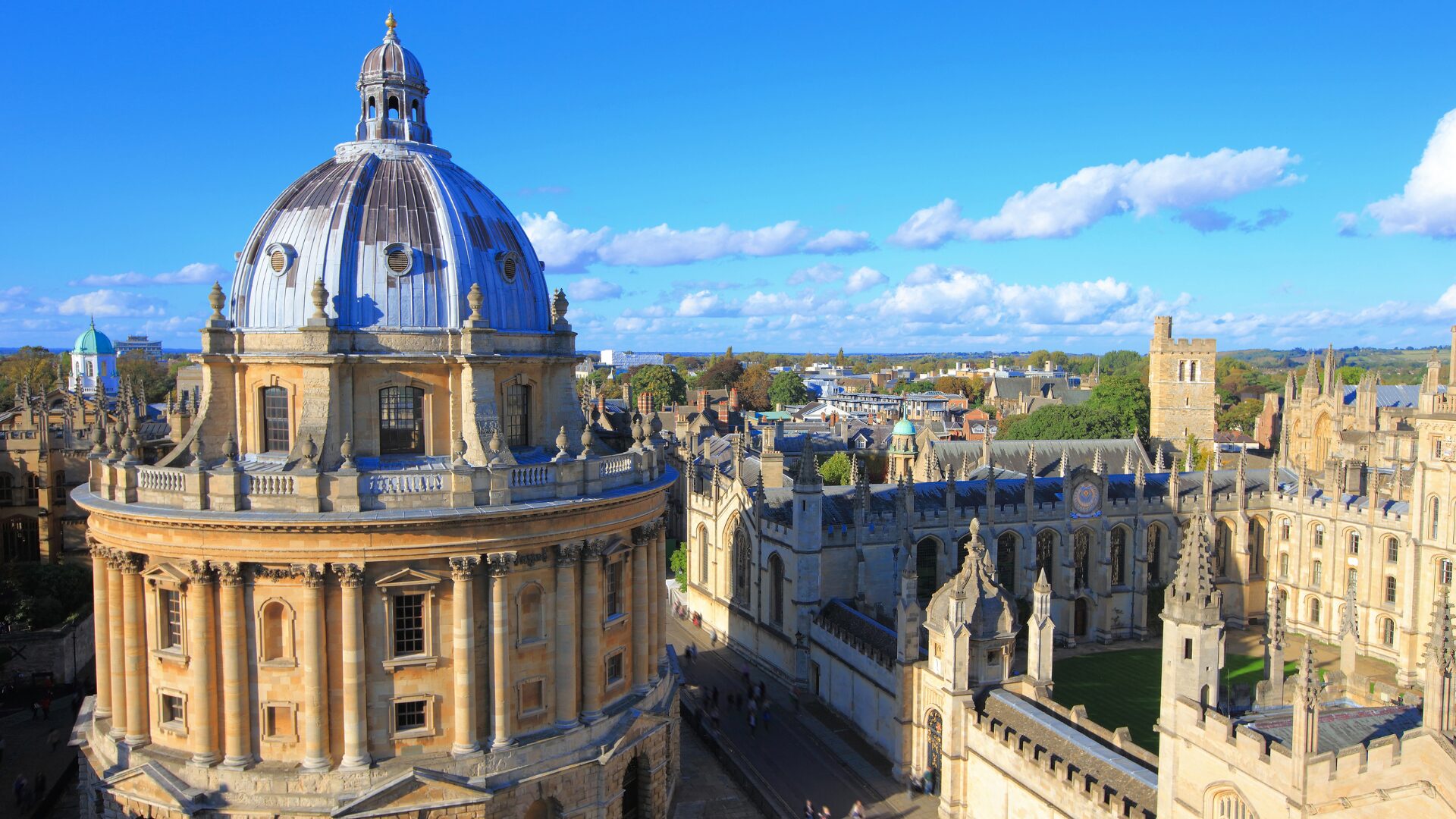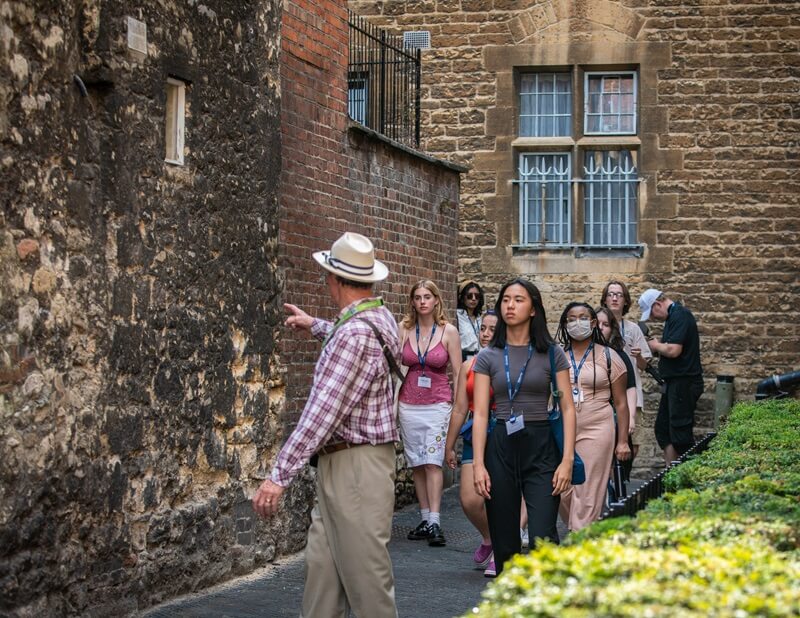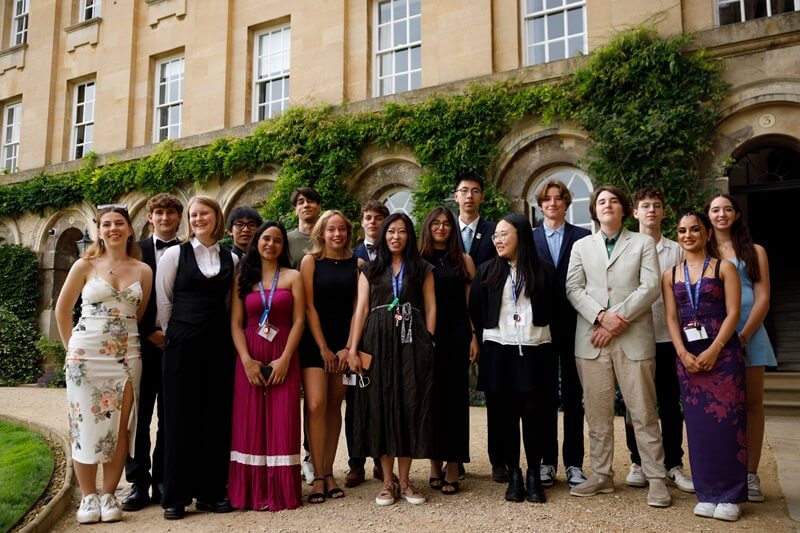When was Oxford University founded? The answer isn’t as straightforward as it seems. Oxford has no official founding date, yet evidence of teaching in the city stretches back to 1096.
What began as informal gatherings of scholars slowly evolved into one of the world’s most influential universities.
In this article, we’ll uncover how Oxford took shape, how old Oxford University is, what shaped its early growth, and how it became a lasting symbol of learning that continues to inspire minds across the globe.
So, When Was Oxford University Founded?
Oxford’s beginnings are shrouded in mystery. There’s no single founding moment, only centuries of growth that shaped the university we know today.
The Origins of Learning in Oxford
Teaching in Oxford can be traced back to around 1096, making it the oldest university in the English-speaking world.
At that time, England was still recovering from the Norman Conquest, and formal education was rare. Yet in this small city, scholars began gathering to exchange ideas and teach theology, logic, and philosophy.
This early period places Oxford’s beginnings long before events like the English Civil War or even the rise of the Aztec Empire. Its age highlights how deeply rooted education is in Oxford’s identity, a tradition that has endured for more than nine centuries.
Why There’s No Official Founding Date
Unlike many universities that began with a royal charter or formal establishment, Oxford developed naturally over time. It wasn’t built in a single year or by one founder. Instead, it grew as scholars and tutors settled in Oxford to teach and share knowledge.
This organic evolution makes pinpointing a founding date impossible, which is why historians still debate when Oxford University was founded. The idea of a university slowly emerged as more students arrived, teaching became structured, and the city gained a reputation for learning.
By the 12th century, Oxford had already established itself as a thriving centre of scholarship recognised across Europe.
Oxford and the 12th Century Expansion
Oxford’s transformation from a small gathering of scholars into a recognised university began in the 12th century. Influences from abroad and royal intervention played key roles in shaping its early identity.
The Paris Connection
To understand when Oxford University was founded, it helps to look at its early links with the University of Paris. Oxford’s development was shaped by scholars who studied in Paris before returning home with new ideas.
Many English scholars studied in Paris before returning home, bringing with them new ideas about teaching and scholarship. At the time, Paris was Europe’s leading centre of learning, known for its focus on theology and philosophy.
The great cathedral school of Notre Dame also played an important role in this intellectual movement, shaping the methods and ideals that early Oxford scholars later adopted.
When unrest in Paris disrupted studies around 1167, many of these scholars came back to Oxford. They carried continental academic traditions with them, helping transform Oxford from a small community of teachers into an emerging university.
1167 – The Turning Point
The year 1167 is often seen as the true beginning of Oxford University. When King Henry II banned English students from attending the University of Paris due to political tensions with France, many scholars returned home. Oxford quickly became their new centre of study.
This sudden return of educated scholars brought fresh energy and structure to the city’s teaching community.
Classrooms grew, ideas flourished, and Oxford’s reputation spread across Europe. Although still informal, by the end of the 12th century, Oxford was recognised as a leading place of learning in England.
The First Colleges and Organisation
As Oxford’s community of scholars grew, the need for order and stability became clear. The creation of colleges gave the university structure, identity, and permanence.
From Scholars to Structure
In its earliest days, Oxford was not yet a university in the modern sense. It was a loose gathering of teachers and students who met wherever space allowed. There were no buildings officially affiliated with the university or individual colleges – just groups of scholars dedicated to learning.
The creation of colleges changed that.
They provided formal places for teaching, living, and study, turning Oxford into a structured academic community. This shift laid the groundwork for the collegiate system that still defines the university today.
The Founding of University College
University College is traditionally considered Oxford’s first college, founded in 1249 by William of Durham. He left funds in his will to support ten masters studying theology, which led to the establishment of a permanent academic foundation. This marked a crucial turning point in Oxford’s development.
Soon after, Balliol College was founded around 1263, followed by Merton College in 1264. Merton’s statutes formalised the structure of college governance, study, and discipline, setting a model that later colleges would follow.
These early foundations gave Oxford stability and a lasting framework for education.
What Oxford Colleges Represented
Colleges gave Oxford the structure and stability it had long needed. They offered financial support for scholars, organised housing, and a sense of shared purpose. Within these walls, students could live, learn, and debate under guided supervision.
This new model transformed Oxford from a loose gathering of independent teachers into a permanent seat of learning. The colleges became the heart of university life, creating a strong community that fostered scholarship and intellectual exchange for generations to come.
Today, you can experience this same atmosphere through our Oxford summer school, where world-class teaching and historic surroundings create an inspiring academic experience.
Join the Immerse Education 2025 Essay Competition
Follow the instructions to write and submit your best essay for a chance to be awarded a 100% scholarship.

Medieval Oxford and Religious Influence
During the Middle Ages, Oxford’s identity was deeply tied to religion. Understanding when Oxford University was founded also means recognising how faith shaped its earliest years.
The Roman Catholic Church influenced its curriculum, its students, and even its daily routines, ensuring that faith and scholarship developed side by side.
Theology and the Church
In medieval Oxford, theology was considered the highest form of study.
Most teaching focused on religious doctrine, philosophy, and the liberal arts, all designed to prepare scholars for service in the Church. Many tutors were clergy, and most students trained for clerical or academic careers.
Oxford’s strong connection to the Church not only secured its influence but also positioned it as a moral and intellectual authority in medieval England.
Conflict and Growth
Oxford’s rapid growth in the 13th century also brought tension. As the number of students increased, so did clashes with local townspeople. These “town-and-gown” conflicts often turned violent, fuelled by disputes over rent, behaviour, and authority.
One major outbreak in 1209 led many scholars to flee Oxford for safety. Some of them settled in Cambridge, where they continued teaching. That move eventually led to the founding of Cambridge University, Oxford’s long-standing academic counterpart.
Despite the unrest, Oxford recovered and grew stronger, emerging as England’s most important centre of learning.
Oxford During the Renaissance and Reformation
As Europe entered the Renaissance, Oxford began to evolve beyond its medieval traditions. New subjects, new ideas, and intense religious change reshaped the university’s intellectual life.
New Thinking and New Subjects
The Renaissance brought a surge of interest in classical learning.
Oxford scholars began studying Latin, Greek, mathematics, and natural philosophy, broadening education beyond theology, philosophy and the liberal arts. Humanist thought encouraged critical inquiry and a renewed focus on reason and observation.
These changes laid the groundwork for modern scholarship, turning Oxford into a bridge between medieval faith and emerging scientific discovery.
The Reformation and Religious Upheaval
In the 16th century, Oxford became a battleground of religious ideas. The Reformation swept through England, dividing scholars and transforming the university’s identity.
When King Henry VIII broke from the Catholic Church, monasteries and religious institutions across the country were dissolved, including many that supported Oxford.
Despite the turmoil, the university endured. It restructured its colleges and adapted to new religious authority, continuing to educate England’s leading thinkers, theologians, and statesmen. Through reform and resilience, Oxford maintained its role as a centre of learning in a rapidly changing world.
The Civil War and Oxford’s Political Role
By the 17th century, Oxford was more than a place of learning; it had become a stage for national conflict. The English Civil War tested the university’s loyalties and resilience.
Oxford as a Royalist Stronghold
When war broke out in 1642, Oxford supported King Charles I and became his temporary capital.
Royal courts, advisers, and soldiers filled the colleges, turning lecture halls into council chambers and storage rooms for supplies. The university’s allegiance to the monarchy defined its political stance during this turbulent time.
Recovery and Renewal After the War
After the Royalist defeat in 1651, Oxford faced decline. Many scholars lost their positions, and the university’s close ties to the monarchy left it politically vulnerable. Buildings were damaged, and morale was low.
Yet Oxford slowly rebuilt.
Under the restored monarchy, it regained stability and renewed its academic mission. The university once again became a respected centre of scholarship and governance, reaffirming its influence in England’s intellectual and political life.
Oxford in the Enlightenment and the 19th Century
The Enlightenment and the 19th century brought major changes to Oxford. The university had to balance tradition with the growing demand for modern knowledge and reform.
Slow Reform and Modernisation
For centuries, Oxford’s teaching focused on theology and classics. However, by the 19th century, social and intellectual movements pushed for broader access and updated study.
The ideals of the Enlightenment and events such as the French Revolution highlighted the growing importance of secular knowledge and intellectual freedom. In response, Oxford gradually opened its doors to wider perspectives. Religious tests were lifted, allowing non-Anglicans to enrol, and new subjects like science, history, and modern languages were introduced.
These reforms transformed Oxford into a more inclusive and forward-thinking institution, setting the stage for its modern academic excellence.
Those eager to experience this world of learning today can do so through our Oxford summer school, where you can explore new ideas while studying in the heart of one of the world’s most historic universities.
The Rise of Research and Publishing
The growth of Oxford University Press marked a defining moment in the university’s history.
Established formally in the 17th century and expanded in the 19th, it became one of the world’s leading academic publishers. Through its scholarly books, dictionaries, and journals, Oxford University Press spread knowledge far beyond the city’s walls.
This global reach strengthened Oxford’s influence in education and research. It transformed the university into a powerhouse of academic publishing, shaping how knowledge was shared and studied across the world.
Oxford and the Modern Era
The 20th century ushered in a new chapter for Oxford. The university expanded, modernised, and opened its doors to a more diverse global community while preserving its centuries-old traditions.
Expansion in the 20th Century
Oxford grew rapidly throughout the 20th century. New faculties were established, scientific research flourished, and women were formally admitted as full members of the university in 1920. As the century progressed, Oxford welcomed participants from around the world, reflecting its increasingly international outlook.
This expansion cemented Oxford’s reputation as a global leader in higher education.
Global Reputation and Innovation
Today, Oxford stands at the forefront of global education and research.
Its strengths span science, medicine, and the humanities, making it one of the world’s most respected universities. Oxford researchers lead breakthroughs in fields such as vaccine development, artificial intelligence, and climate science, while its humanities scholars continue to shape cultural and historical understanding.
Consistently ranked among the top universities worldwide, Oxford blends tradition with innovation. Its continued influence ensures it remains a driving force in shaping ideas, discoveries, and leaders across every discipline.
Through our Oxford summer school programmes, participants gain a taste of university life while learning from expert tutors in a truly inspiring academic environment.
How Old Is Oxford University Compared to Others?
Questions about when Oxford University was founded often arise when comparing it with other ancient universities.
Oxford’s long history sets it apart as one of the oldest and most enduring institutions of learning in the world. Its age sets it apart, marking it as one of the oldest and most enduring universities in the world.
Older Than Harvard – and Almost Everything Else
Oxford predates Harvard University by more than 500 years. While Oxford’s recorded teaching dates back to 1096, Harvard was founded much later, in 1636. Oxford’s roots even stretch further back than the Aztec Empire, which began around 1325.
This extraordinary longevity places Oxford among a rare group of institutions that have not only survived but thrived through centuries of social, political, and cultural change.
Among the World’s Oldest Universities
Oxford stands alongside a handful of ancient universities that helped define higher education.
The University of Bologna, founded in 1088, is often recognised as the oldest university in the world, while the University of Paris emerged around 1150. Oxford, with evidence of teaching from 1096, developed soon after Bologna and before Paris.
Together, these institutions laid the foundations for the European university system. What sets Oxford apart is its unbroken continuity. It remains one of the earliest established centres of higher learning, still active and influential today.
Oxford’s Legacy Through the Centuries
Oxford’s enduring success lies in its ability to evolve while preserving its core traditions. The university’s collegiate system continues to shape its character and community.
A Network of Colleges and Scholars
From historic foundations like Trinity College to newer additions established in the modern era, Oxford’s colleges remain at the heart of university life. Each college has its own traditions, culture, and community, creating a sense of belonging within the wider institution.
This network of colleges fosters collaboration, independence, and intellectual exchange, ensuring that Oxford’s spirit of learning continues to thrive across generations.
Famous Alumni and Achievements
Oxford’s influence is reflected in the achievements of its alumni. The university has produced world leaders, Nobel laureates, renowned authors, and pioneering scientists, including:
- Margaret Thatcher
- Tony Blair
- Bill Clinton
- Indira Gandhi
- J.R.R. Tolkien
- Oscar Wilde
- Stephen Hawking
Across politics, literature, and research, its graduates continue to shape the world through innovation and leadership.
Oxford’s Influence on Modern Education
Oxford’s model of higher education has inspired universities across the world.
Its collegiate structure, blending independent colleges with central governance, became a blueprint for institutions in the United States and Commonwealth countries.
Universities such as Harvard, Yale, and Toronto drew on Oxford’s traditions of tutorial-style teaching, college communities, and academic self-governance. This influence helped shape global approaches to higher education, ensuring that Oxford’s legacy extends far beyond the United Kingdom.
Oxford University Today
Oxford continues to balance the weight of its history with the demands of modern scholarship. The university honours its ancient traditions while embracing innovation and progress.
A Blend of Tradition and Innovation
Walking through Oxford today, you’ll see a unique mix of old and new. Traditional elements like academic gowns, formal halls, and centuries-old libraries coexist with cutting-edge laboratories and digital research centres.
The Bodleian Library stands beside state-of-the-art science parks, and time-honoured ceremonies unfold in a city filled with global collaboration.
This blend of heritage and innovation keeps Oxford both timeless and forward-looking.
The Role of Oxford in the 21st Century
Oxford remains at the forefront of global education and research. Its scholars lead pioneering work on some of the world’s most pressing challenges, from climate change and sustainable energy to artificial intelligence and medical ethics.
Through international partnerships and groundbreaking studies, Oxford continues to shape global conversations and solutions. The university’s commitment to progress, collaboration, and discovery ensures its role as a leader in education well into the future.
Common Questions About Oxford’s Founding
Is Oxford University 1,000 Years Old?
Oxford is not officially 1,000 years old, but it is close. Evidence of teaching in Oxford dates back to around 1096, meaning the university has been active for more than 900 years. Its long history makes it one of the oldest centres of learning in the world.
Who Founded Oxford University?
No single person founded Oxford University. It developed naturally as scholars gathered to teach and debate in the city. Over time, this community of thinkers evolved into the organised university we recognise today.
Was Oxford Older Than the Aztecs or Harvard?
Yes. Oxford predates both the Aztec Empire and Harvard University. The Aztec Empire began around 1325, while Harvard was founded in 1636. Oxford’s teaching traditions were already well established centuries before either came into existence.
Conclusion
The story of when Oxford University was founded is one of gradual evolution, resilience, and adaptation.
From its beginnings in the 11th century to its position today as a world leader in education and research, Oxford has continually redefined what it means to pursue knowledge. Its history reflects the enduring power of learning, shaped by faith, discovery, and curiosity over more than nine centuries.
Discover more about studying in Oxford through our Oxford summer school programmes, where centuries of tradition meet today’s brightest minds in a transformative learning experience.





















